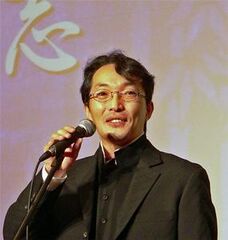Hiroshi Hamagaki
From Sega Retro
- Not to be confused with Koki Sadamori.

|
| Hiroshi Hamagaki |
|---|
| Employment history:
SystemSoft (1986[1] – )
Sega Enterprises (1988[1] – 1990-10)
Divisions:
Genki (1990-10 – )
|
| Role(s): Artist, Director, Executive |
| Twitter: @sadajpe1 |
This teeny-tiny article needs some work. You can help us by expanding it.
Hiroshi "Sada" Hamagaki[2] (浜垣 博志) is the president and CEO of Genki[3] and a former artist and director at Sega Enterprises who worked in Yu Suzuki's team. He and programmer Tomoharu Kimura left Sega to found Genki in 1990, where they are best known for the Tokyo Xtreme Racer series[4].
Career
[NOTE: The following dates are taken exactly from the source, but many seem to be 1 year later than their actual events, either conflicting with other reports or with game release dates]
Hiroshi Hamagaki joined Coreland in 1983, where he was seconded as a chief artist for Sega's Hang-On[1] That same year, 1985, he began working at SystemSoft on the game Gendai Daisenryaku, and then in 1988 he joined Sega Enterprises as an experienced game director, working on games like After Burner, Turbo OutRun, Super Hang-On G-LOC: Air Battle (otherwise known as R-360)[1].
In 1991, Hamagaki founded Genki and was appointed its CEO and executive producer[1]. Notable games he oversaw include Kileak: The DNA Imperative, BRAHMA Force: The Assault on Beltlogger 9, the Tokyo Xtreme Racer series (Shutokou Battle and Kaidou Battle series in Japan), Phantom Crash and its sequel S.L.A.I.: Steel Lancer Arena International, Jade Cocoon: Story of the Tamamayu, the Kengo series and Fu-un Shinsengumi. He eventually established mobile and Singapore branches of Genki.
In 2007, he was appointed CEO of GungHo Mode[5][1] and a year later executive director and director of development HQ at GungHo Online Entertainment[1]. The same year, he was appointed director and general manager of the development HQ at Game Arts[1]. In 2010 he became the CEO of Nonki[6][1].
Production history
- Bullfight (System 1; 1984)
- My Hero (System 1; 1985)
- Hang-On (Hang-On hardware; 1985) — Chief Artist
- Super Hang-On (Hang-On hardware; 1987) — Director
- After Burner (X Board; 1987) (as Sada)
- After Burner II (X Board; 1987) (as Sada)
- Power Drift (Y Board; 1988) — Staff
- Dynamite Dux (System 16; 1988) — Special Thanks[7] (as sada "monster of marsh")
- Turbo OutRun (OutRun hardware; 1989) — Sp. Thanks (as Sada)
- Sword of Vermilion (Mega Drive; 1989) — Director (as Sada)
- Sword of Vermilion (Mega Drive; 1989) — Game Design (as Sada)
- Sword of Vermilion (Mega Drive; 1989) — Map Design (as Sada)
- G-LOC: Air Battle (Y Board; 1990)
- Defenders of Oasis (Game Gear; 1992) — Graphic Design[8] (as Sada)
- Metal Fangs (Mega Drive; 1993) — Assistant[9] (as H.H)
- A/X-101 (Mega-CD; 1994) — CG Art[10] (as Sada)
- Robotica: Cybernation Revolt (Saturn; 1995) — Rendering[11]
- Hang-On GP (Saturn; 1995) — Special Thanks[12]
- Virtua Fighter 3tb (Dreamcast; 1998) — Special Thanks
- Tokyo Xtreme Racer (Dreamcast; 1999) — Executive Producer
- Daytona USA 2001 (Dreamcast; 2000) — Special Thanks
References
- ↑ 1.0 1.1 1.2 1.3 1.4 1.5 1.6 1.7 1.8 1.9 http://www.nonkinet.com/company/kigyouannai.html (Wayback Machine: 2018-08-29 11:13)
- ↑ https://www.mobygames.com/person/61224/hiroshi-hamagaki/shots/23744/
- ↑ https://ascii.jp/elem/000/000/345/345578/ (Wayback Machine: 2021-08-12 00:58)
- ↑ https://web.archive.org/web/20231213212906/https://twitter.com/sadajpe1 (archive.today)
- ↑ https://www.gungho.co.jp/jp/news/uoiv2k0000001nyx.html (Wayback Machine: 2019-07-18 01:52)
- ↑ https://gamebiz.jp/news/41957 (Wayback Machine: 2022-05-21 18:11)
- ↑ File:DynamiteDux arcade credits.pdf
- ↑ File:Defenders of Oasis GG credits.pdf
- ↑ File:Metal Fangs MD credits.pdf
- ↑ File:AX101 MCD JP SSCredits.pdf
- ↑ File:Deadalus_Saturn_JP_SSEnding.pdf
- ↑ File:Hang-On GP Saturn credits.pdf